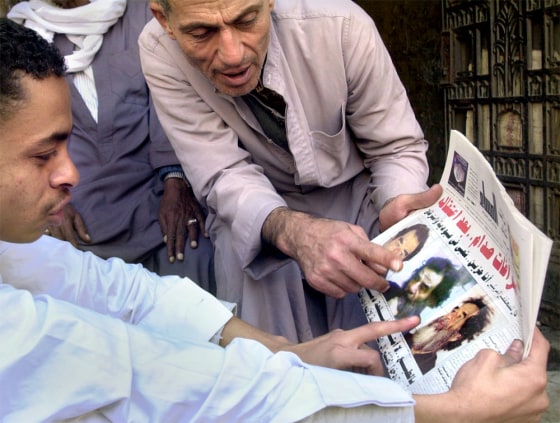On the streets of Cairo, Saddam Hussein's arrest was greeted Monday with a little joy, some disappointment and lots of ambivalence.
Although people were happy the Iraqi people need no longer fear a hated tyrant, some saw Saddam's capture as further reason for the United States to leave Iraq. "The general attitude here in Egypt is that everyone hates Saddam Hussein. Everyone here knows that he is a war criminal, so I guess it is good that he has been caught," said Shereen Samaa, a business student at the American University of Cairo.
But she, like others, said his capture means the United States no longer has just cause to stay in Iraq.
"They did what they came for. What they said they came for was to release the Iraqi people from Saddam Hussein. So it's done, it's over. And why are they staying there?"
Saed Ibrahim, a day laborer, agreed as he took a break from his backgammon game while the TV overhead rebroadcasts tape of a bearded Saddam having his mouth examined. "President Saddam Hussein is a bad man. He occupied Kuwait. He killed many people in Iran and Iraq, but I want United States out of Iraq."
Some joy
Some Egyptians did express joy, seeing the arrest as a triumph for democracy.
"The news was terrific," said a smiling English teacher who refused to give his name. "This is a New Year's present for all the people and for the people who believe in democracy. … I think all people are sharing this feeling of surprise, happiness and shock."
"This is American style," he said, laughing.
For Adham Sharkawi, an engineering student, Saddam's arrest changed his attitude about the war. "Bush now has strong evidence that the war was right and correct."
A political analyst, Gamal Abdel Gawad, thinks Saddam's arrest may prod other Arab leaders toward political reform.
"Probably this scene of Saddam Hussein being captured will be a contributing factor toward democratization and respect of human rights in the Arab World. It will show people that it is possible to bring about justice, it is possible to get rid of tyrants. It will make other leaders in the Arab World more cautious, less reluctant to bring about political reform in the region."
Dishonor
Still, some felt that Saddam Hussein's arrest brought dishonor to the Arab World because he surrendered without a fight.
"I thought that if they did capture him, he would commit suicide, he would never let himself be captured by the Americans," said Fadi Michael, a pre-med student.
Abdel Gawad suggested people's ambivalent feelings could be attributed to humiliating images of a helpless Saddam appearing to solicit help from his captors.
"The way that he responded to being captured, surrendering, not fighting, not even committing suicide … cooperative as he was described by Paul Bremer, cooperating with the doctor, asking for help, all those things in fact made Saddam look like a miserable, poor person who is seeking any kind of assistance, even from the Americans who he described as the enemy that he will fight until the last drop of blood. This kind of attitude on his part caused many people to feel this is a disgrace.”
Reaction was also muted by the fact that Egyptians, while happy to see a tyrant brought to justice, were unhappy to see Americans doing the job.
Egyptians were staunchly opposed to the war and reject the continued occupation. Abdel Gawad said that if Saddam were tried in Iraq, it would at least spare the Arabs the additional humiliation of an Arab leader being tried by non-Arabs. Most here agree that it is the Iraqis who suffered and the Iraqis who must seek justice.
"I do think that it is better for the Arab World, for the whole region to bring him to trial in Iraq, just to show that we, the Arabs, can bring justice by ourselves," said Abdel Gawad. "It's not something that's imposed on us by others."
Egyptian cafes were packed with people riveted to TVs when U.S. troops pulled down the dictator's statue months ago. But on Sunday, a scant few watched dispassionately as a bedraggled Saddam was displayed by his captors.
"People now learned the lesson that it's not about controlling or capturing a city or leader. It's about creating a new Iraq, a democratic prosperous Iraq and this is not an easy job," said Abdel Gawad. Even with Saddam gone, victory still seems remote.
